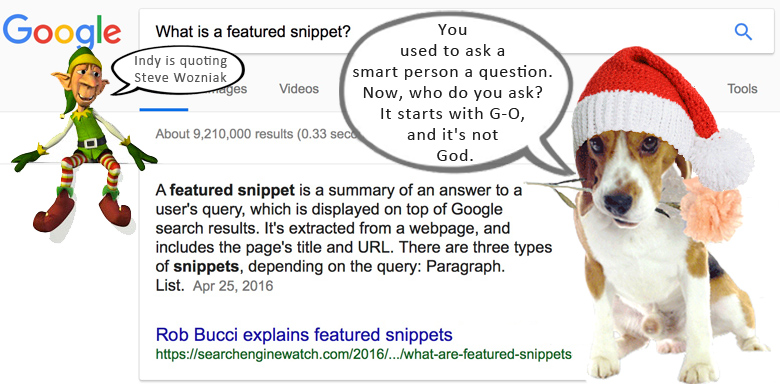 Reading that Leo Tolstoy (1828-1910) was a Christian anarchist, I had an unexpected thought, so I asked Google, “What is the difference between an anarchist and a libertarian?”
Reading that Leo Tolstoy (1828-1910) was a Christian anarchist, I had an unexpected thought, so I asked Google, “What is the difference between an anarchist and a libertarian?”
Six-tenths of a second later, The Goog told me – in a highly visible block at the top of the Search Engine Results Page:
“An anarchist is an extreme libertarian, like a socialist is an extreme democrat, and a fascist is an extreme republican. It’s like the difference between a lover and a rapist. They’re both in the same place but one uses violence to get there. Libertarians believe in free markets, private property, and capitalism.”
And included in that featured snippet was a hyperlink to ChaosPark.com, the low-budget website of a better-than-average writer named Harry Reid.
Harry paid nothing for Google’s recommendation of him and his website. He earned it by crafting the most concise, cogent answer to an often-asked question.
Google is rewarding writers of concise content, wordsmiths who get to the point.
When Google’s featured snippet is your answer to a commonly asked question in your business category, Google is telling the world that YOU are the expert of experts. It seems, to me, this should be the goal of every Search Engine Optimizer.
But this would require them:
- to be experts in your business category, and
- to be better-than-average writers.
But since they are neither of these, they will tell you the secret to becoming a featured snippet is in the microdata, and then fly into a blur of activity with a flurry of sparks and elbows.
Take a quick look at Harry Reid’s ChaosPark.com and I think you’ll see that Harry doesn’t give a rat’s ass about microdata, metadata, or SEO. He’s just a guy writing about things that interest him, and he knows how to summarize big ideas in few words.
Does your business interest you? Can you summarize big ideas in few words?
Before you can take a person to where you want them to go, you must meet them where they are.
You must answer their questions –as asked– and speak to them within the frame of their own experience.
Leo Tolstoy knew this, and he used his novels as instruments for the examination of social issues. War and Peace (1869,) Anna Karenina (1887,) and The Death of Ivan Ilyich (1886,) were not meant to be entertainments, but persuasive lessons about life and living. Tolstoy met his readers where they were, so that he could take them where he wanted them to go.
John knew this, too, so he framed his Good News to be easily understood by the people of the region in which he made his home. One of the 4 “first followers” of Jesus, John wrote to the people of Ephesus within the frame of their own experience.
But that’s another story.
What does your customer already care about?
What does your customer already understand?
If you will be persuasive, you need to begin your story exactly there.
Before you take a person to where you want them to go, you must meet them where they are.
Roy H. Williams